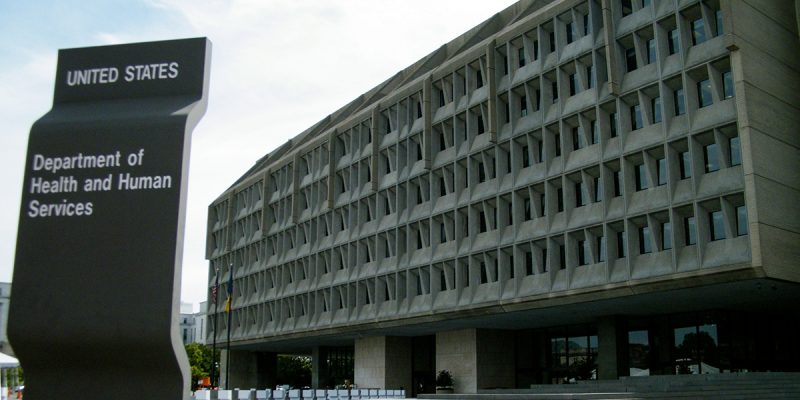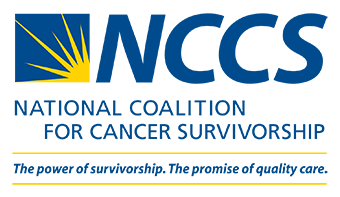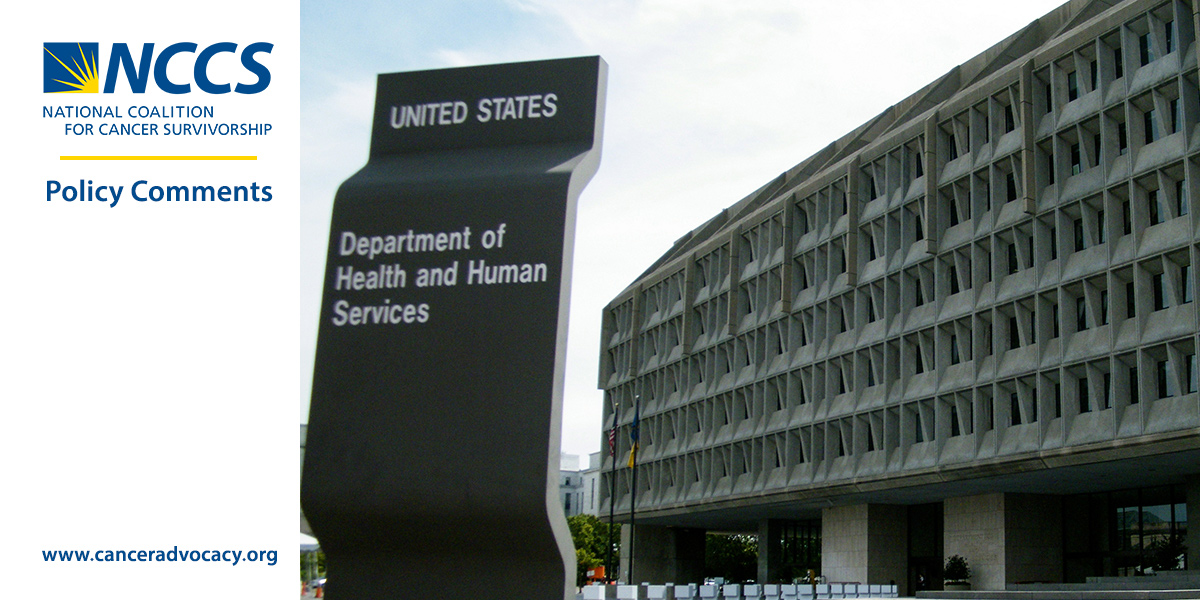NCCS Raises Concerns Over Impact on Patients of Medicare Physician Fee Schedule Revisions

NCCS submitted comments to the Centers for Medicare and Medicaid Services (CMS) on the Medicare physician fee schedule revisions proposed for calendar year 2019 and proposed revisions in the Quality Payment Program.
In our comments, NCCS addressed proposed changes to evaluation and management services, which are provided in the office or outpatient setting and are a critical element of cancer care. CMS proposed creating a composite code for evaluation and management services, rather than the existing codes that recognize levels of complexity and intensity of the service provided. We raised concerns about the significant impact the changes will have on cancer care providers, and in turn, on cancer patients, who have complex needs and require sufficient time with their medical team.
NCCS also commented on the Quality Payment Program, which we believe has significant value. NCCS supports the efforts to strengthen the program, to ensure that more clinicians participate in the program, and to provide a valid basis for evaluating clinicians and comparing performance.
In addition to submitting our own comments, NCCS signed comment letters with the Cancer Leadership Council and the Consumer-Purchaser Alliance.
Read the full NCCS letter below.
View/download the Cancer Leadership Council (CLC) letter »
View/download the Consumer-Purchaser Alliance letter »

September 10, 2018
Seema Verma, MPH
Administrator
Centers for Medicare & Medicaid Services
Department of Health and Human Services
200 Independence Avenue, SW
Washington, DC 20201
Re: CMS-1693-P, Medicare Program; Revisions to Payment Policies under the Physician Fee Schedule and Other Revisions to Part B for CY 2019
Dear Ms. Verma:
The National Coalition for Cancer Survivorship (NCCS) is a national organization engaged in public policy efforts to ensure access to quality cancer care for survivors of all forms of cancer. We appreciate the opportunity to comment on the Medicare physician fee schedule revisions proposed for calendar year 2019 and proposed revisions in the Quality Payment Program. We focus our comments on the impact of these proposals on cancer patients and their access to quality care.
Changes in Evaluation and Management Payments
Evaluation and management (E/M) services, provided in the office or outpatient setting, are a critical element of cancer care. Cancer care is planned, complex treatment is provided, symptoms are managed, and patients receive “care” in E/M visits. Because of the importance of E/M services for Medicare beneficiaries and also the significant Medicare expenditures for these services, it is understandable that the Centers for Medicare & Medicaid Services (CMS) would direct its attention to these services and how they are reimbursed. However, we think that the proposed changes in E/M payment should be reconsidered.
CMS has proposed to combine the level 2-5 codes into one composite code and to require that Medicare providers only document a level 2 visit to receive the new composite code. CMS also added two additional options (time and medical decision-making) for providers to document the level of E/M services that they bill. The agency stresses the importance of the changes in documentation, which it says will reduce the burden of documentation on providers and improve the quality of the interaction between providers and patients in the E/M visit. In the proposed rule, the changes in documentation and the E/M composite code are linked, and there is the implication that the reduction in the documentation burden justify the payment changes.
NCCS does not support the changes in E/M codes and payment. The recommended change is a departure from the resource-based relativity of the fee schedule. If such a change is to be made, it should be undertaken only with significantly more discussion about the implications of such a shift in payment and consideration of other payment options. The proposed rule does not include any serious discussion of the magnitude of this change and its implications for patients.
Many E/M visits for cancer patients are level 4 and 5 because of the time and medical decision-making required for the visit. As a result, the plan to pay a composite rate for level 2 to 5 visits will have a significant impact on cancer care providers. The impact may be especially significant for those oncology practices with a mix including more complex patients. We are concerned that there will be a significant negative impact on cancer patients as a result of the E/M payment changes.
If the proposed changes in documentation in fact have a positive impact on the interaction between patients and providers in E/M visits, as the agency suggests, the changes should still not be accomplished at the expense of E/M payments.
We note that CMS, in addition to proposing a composite rate of payment for level 2 to 5 visits, proposes add-on codes for primary care, add-on codes for certain specialty care, and a new prolonged E/M code (for an additional 30 minutes of clinician time). Those professionals who are providing cancer care are likely to be providing E/M services that will qualify for the add-on specialty care code and the prolonged E/M code. CMS has identified hematology/oncology as one of the specialties for which the add-on code and prolonged visit code might be utilized. We urge CMS to clarify that not only these specialists but also others who are providing cancer care – radiation oncologists, surgical oncologists, and others – should also be permitted to use the add-on and prolonged visit code. Finally, we recommend that CMS clarify the frequency with which the codes may be used and offer assurances that use of these codes will not trigger audits of providers.
Although we support the add-on codes and prolonged visit codes, we believe that they should have been proposed even without the recommendation of a composite code for level 2 to 5 visits. If CMS reconsiders the composite code, as we recommend, it should not abandon the add-on codes and prolonged visit code. For a number of years, NCCS and its colleagues in the cancer community have advocated a code for cancer care planning and coordination. We believe that certain cancer care E/M visits require complex medical decision-making related to treatment planning and care coordination and also require significant time. For these E/M visits, we have suggested a special code and payment acknowledging the nature of the service. The add-on code and prolonged visit code are consistent with the rationale we offered to describe the cancer care planning code. We urge that they be retained by CMS, at least for use by cancer care providers, even if the composite code is reconsidered.
A Working Group to Review E/M Codes
The American Medical Association and other medical societies have recommended that the E/M code changes be withheld while a working group of medical professionals offers advice to CMS about a more comprehensive overhaul of E/M codes. We support this recommendation, and NCCS will seek to participate in any discussion about E/M codes that is undertaken, in order to provide a patient perspective on quality E/M services. Patients who receive important care through E/M visits have experience that permits them to provide advice about structuring such visits for optimal provider-patient interaction.
Quality Payment Program
We believe that there remains significant value in the Quality Payment Program, and we support the efforts to strengthen the program, to ensure that more clinicians participate in the program, and to provide a valid basis for evaluating clinicians and comparing performance. To that end, we support the requirement that providers continue to report quality measures for a full-year rather than just 90 days. However, we have misgivings about the proposal to extend the delay in public reporting of quality measures from one year to the first two years that a measure is used in the quality performance category. We are also concerned about the low-volume thresholds, because they result in exempting many clinicians from required participation in the program. Finally, we caution against the continuation of the menu approach to measure selection in the quality performance category. These actions combine to slow the progress in full implementation of the QPP and in fostering evaluation of more clinicians reporting a consistent set of measures.
We commend CMS for proposing to adopt four patient-reported outcome measures. These include three measures related to average change in functional status following lumbar spine fusion surgery, following total knee replacement surgery, and following lumbar discectomy laminotomy, as well as average change in leg pain following lumbar spine fusion surgery. Patient-reported outcome measures like these provide information about care and functional status that cannot be obtained from other sources. We are especially pleased to see the emphasis on change in functional status. Consistent with our view that this is an important measure for understanding patient quality of life, we are undertaking a patient-driven measure development process toward a measure of return to functional status after cancer treatment.
In response to the CMS request for input about the patient-reported outcomes (PROs) that improve clinical outcomes, we offer our view that PROs are important for the information that they convey about patient response to treatment and care. For example, PROs that provide information about quality of life and improved functioning are important even if they do not provide information about improvement in clinical outcomes. As stated above, that commitment to patient-reported outcome measures (PROMs) has prompted NCCS to be engaged in a patient-focused measure development effort related to return to functional status after cancer treatment.
NCCS appreciates the opportunity to comment on proposed changes in the physician fee schedule and Quality Payment Program for 2019. We look forward to additional discussion with CMS regarding strategies to make E/M visits truly patient-centered.
Sincerely,

Shelley Fuld Nasso, MPP
Chief Executive Officer
Download the full letter to the Centers for Medicare and Medicaid Services (CMS) » [PDF]
Read more NCCS Policy Comments »
Related Posts
https://canceradvocacy.org/policy-comments/nccs-statement-hhs-final-rule-short-term-health-plans/




